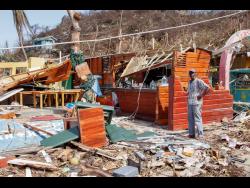Last June, Hurricane Beryl, a powerful Category 5 storm, left a trail of destruction in its wake, underscoring the extreme vulnerability of Caribbean Small Island Developing States (SIDS) to climate change. Although these nations contribute little to global warming, they are on the front lines of climate change, disproportionately bearing the brunt of increasingly severe storms.
Struggling to recover from these climate shocks, they face crippling debt while trying to both meet the United Nations 2030 Sustainable Development Goals (SDGs) and protect existing progress. Caught in a vicious ‘debt-climate trap’, where escalating climate costs deepen existing debt burdens, these Caribbean nations are unable to properly invest in resilience or sustainable development.
Despite a rapidly shifting geopolitical landscape marked by the erosion of multilateralism and a new era of tariffs, it is imperative that the international community acknowledge its responsibility in this global crisis. While Caribbean SIDS have demonstrated their commitment to climate action, they cannot be expected to carry the burden alone. The world’s wealthiest nations, who have historically contributed the most to climate change, must step up and honour their commitments to provide the necessary resources.
In this regard, as the only multilateral, rules-based institution responsible for promoting global macroeconomic and financial stability, the International Monetary Fund (IMF) has a central role to play in helping its member countries to urgently unlock and mobilise substantial, affordable climate finance while supporting their debt sustainability prospects.
The IMF should be commended for establishing the Resilience and Sustainability Trust (RST) in April 2022. Resources for the RST mainly come voluntary rechannelling by the largest economies of their Special Drawing Rights (SDRs) as part of the Fund’s 2021 historic SDR allocation. Through the RST’s lending arm, the Resilience and Sustainability Facility (RSF), the IMF provides concessional, longer-term financing to help eligible member countries address macro-critical structural challenges, including climate change. But as global climate challenges intensify, the IMF must accelerate its efforts, driving more bold and innovative solutions to help vulnerable nations like those in the Caribbean escape the debt-climate trap.
SWIFTLY APPROVED
By early March 2023, the IMF’s Executive Board had swiftly approved RSF arrangements for five pilot countries — Costa Rica, Barbados, Rwanda, Bangladesh, and Jamaica — alongside concurrent IMF-supported programmes. By the end of December 2024, the number of RSF programmes had expanded to 21.
We recently authored a paper for the Task Force on Climate, Development and the IMF on an initial assessment of the RSF experiences of the two Caribbean pilot countries — Barbados and Jamaica — drawing valuable lessons for the design of future RSF-supported programs. Our study made several policy recommendations to ensure that RSF programmes can effectively support the resilience and development of Caribbean SIDS and other vulnerable nations.
We recommend, among other things, that RSF programmes should focus on a few, ambitious, high-depth reforms; that the IMF should candidly highlight the potential risks of lower private climate finance flows; and that RST resources should establish a link between debt and climate finance.
First, Caribbean SIDS and other climate-vulnerable countries are already disproportionately affected by climate impacts, so there is urgent need for RSF programmes to prioritise a few, high -impact reforms that build economic resilience to climate change. In Barbados’ RSF arrangement, the share of low-depth policy reforms was 40 per cent while that of Jamaica was even higher, at 50 per cent, even though both countries have demonstrated strong capacities under previous IMF-supported programmes to undergo high-depth policy reforms in the face of very difficult economic conditions.
TRANSPARENT
Second, the IMF must be transparent about the potential risks associated with RSF programmes not being able to catalyse private climate funding, and the subsequent need for fiscal adjustment beyond those contemplated in concurrent IMF-supported programmes to mitigate these risks. While Jamaica has struggled to attract private climate finance flows during its RSF arrangement, Barbados was able to successfully leverage a debt-for-climate resilience swap, which attracted modest private finance flows.
Third, with risks of lower private climate flows in RSF programmes, the IMF should consider taking a more proactive role in building the case for concessional capital and strategic debt relief. This means deploying more RST resources to create greater fiscal space for climate action by linking debt relief options such as debt pause clauses, debt restructuring and reprofiling, and debt swaps tied to investments in green policies that align with national climate goals. Barbados’ recent debt-for-climate resilience swap serves as a strong illustrative case in which the small Caribbean country was able to buy back $165 million of high-cost debt to finance investment in water infrastructure, food security, and environmental protection.
Using part of the historic SDR allocation to finance the RST and tackle climate change was a hard-fought victory, and the RST needs to be as efficient and catalytic as possible. The IMF’s upcoming review of the RST in 2026 presents a crucial opportunity for transformative change. The future of Caribbean SIDS and other vulnerable nations hinges on swift, bold action from the international community, so important in today’s increasingly polarised geopolitical environment. As Hurricane Beryl painfully demonstrated, climate change is not waiting, and neither should we. The time to act is now — not in 2026.
Jwala Rambarran is a senior advisor for Financial Futures Center and former Governor of the Central Bank of Trinidad and Tobago. Sara Jane Ahmed is managing director and finance advisor to Vulnerable Group of Twenty Group. Send feedback to columns@gleanerjm.com.
